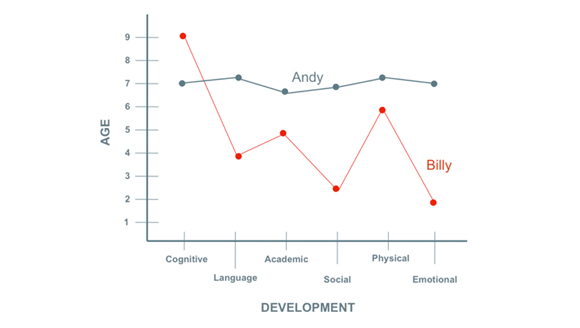| Q: My seven year old son has a history marked by trauma and while I understand this has set him up to act differently, I still find myself so frustrated with him! On one hand, he is so intelligent and gifted (his teacher describes him as "more gifted than the gifted kids"), yet on the other hand, he can't seem to comprehend what I say to him (or he just plain isn't listening to me!). He seems so mature intellectually yet acts like a two year old when things don't go his way. How do I parent a child who is 16 years old one minute and a two year old the next? It's maddening! | ||||||||
A: Children who are raised in predictable environments with consistent caretaking experience the world as both safe and good. They learn to trust themselves and to trust their emotions. They trust others and the world at large. They develop confidence in their ability to think and feel, no matter the situation at hand. However, children who are traumatized by abuse, neglect, and/or abandonment, do not develop such a coherent set of coping skills. They may spend all their resources and energy making certain they are safe since the caretakers around them are not. The lack of consistency and unpredictability in their lives interrupts their normal path of development. To demonstrate this, let's compare two children. First we have "Andy." Andy grew up in a nurturing and structured home. In fact, Andy’s womb experience was ideal. His mother took her prenatal vitamins, she exercised, she modulated her stress level, and she wanted to be pregnant and become a mother. Thus, by the time Andy is seven years old, he has reached his normal developmental milestones and is a high functioning, happy, and lovable child. Billy, on the other hand, has a history of abandonment, rejection, and unpredictability in his history. His mother didn't even want to be pregnant to begin with, so Billy entered the world feeling rejected and unwanted. At the age of seven years old, Billy is disorganized in his ability to navigate the world. He is capable in some areas yet shows massive deficits in other areas. Billy's development has been severely impacted by his life experiences. Here's a graph showing the difference between Andy's developmental path and Billy's developmental failures: |
||||||||
 |
||||||||
Here are six areas of development to consider for your child:
Children need to be accepted for who they are and for what their life experiences have created within them. Unconditional love requires us to get out of our own fears of "babying" our child in order to meet our child exactly at his developmental age. Be honest with yourself and objectively determine the actual capabilities of your child. When you are able to meet your child at his/her level of development, you are opening up the door to healing. Your child will feel more accepted, understood, and validated. This allows love to flow and for the parent/child relationship to be rebuilt. It is in the context of your loving relationship with your child that the graph of Billy can soon look closer to that of Andy. Children are resilient and are neurologically flexible. Healing, and thus behavioral change, takes a willingness to see a child for exactly who he is and to stop expecting him to be like the example of Andy, especially if the child has a traumatic history. For more information and an in-depth look at developmental trauma, click HERE to access my latest DVD series at a special internet price. Press on, |
||||||||
 |
||||||||
| Heather T. Forbes, LCSW Parent and Author of Beyond Consequences, Logic & Control: Volume 1 & Volume 2, Dare to Love, and Help for Billy. | ||||||||
Tuesday, February 3, 2015
Is my child 16 years old or 2 years old?
Subscribe to:
Post Comments (Atom)

No comments:
Post a Comment